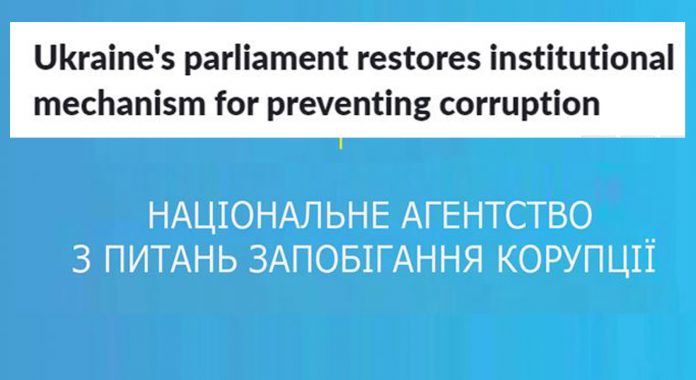Relevant bill No. 4470 was backed by 300 MPs out of the 352 registered in the session hall
KYIV, DEC 15 – The Verkhovna Rada, Ukraine’s parliament, has passed a bill on amendments to the Law of Ukraine on Preventing Corruption to restore the institutional mechanism for preventing corruption.
Relevant bill No. 4470 was backed by 300 MPs out of the 352 registered in the session hall, an UNIAN correspondent reported.
Restoration of powers of Agency on Corruption Prevention
The bill restores the powers of the National Agency on Corruption Prevention (NACP), in respect of which the Constitutional Court did not provide a legal position regarding their unconstitutionality, as well as establishing the specifics of anti-corruption measures against judges.
In particular, the bill establishes the NACP’s powers include monitoring and control over the implementation of legislative acts on ethical behavior, prevention and settlement of conflicts of interest in the activities of persons authorized to perform the functions of the state or local government, and persons that are equal to them.
The NACP monitors and verifies income declarations of government officials, stores and publishes assets declarations, monitors government officials’ income, expenses, and wealth.
The agency is authorized to have direct automated access to information and telecommunications systems, databases, registers, data banks, including those that contain information with limited access, the owner (administrator) of which are state agencies or local self-government bodies; to use state, including government, special communications networks and other equipment.
Among other things, the NACP has the right to conduct on its own initiative an examination of possible facts of violation of the requirements of the law; to make prescriptions on violation of the requirements of the legislation regarding ethical behavior, prevention and settlement of conflicts of interest, other requirements and restrictions provided for by this bill, protection of whistleblowers.
If it establishes evidence that an official received unjustified assets or that such assets were acquired by another person on his or her behalf or in other cases provided for in Article 290 of the Civil Procedure Code of Ukraine, the NACP has the right to ask the Specialized Anti-Corruption Prosecutor’s Office or the Office of the Prosecutor General in cases specified by the bill to appeal to court on the recognition of assets as unjustified and their seizure in favor of the national budget.
In addition, the NACP has the right to initiate an internal investigation, to take measures to bring to justice those guilty of committing corruption or corruption-related offenses; draw up protocols on administrative offenses.
At the same time, the document stipulates that a warrant shall not be submitted in case of violation of the requirements of this bill regarding ethical behavior, prevention and settlement of conflicts of interest in the activities of a judge, a judge of the Constitutional Court of Ukraine. The NACP shall inform the High Council of Justice or the Constitutional Court about the reveal of such violations, respectively.
The NACP’s warrant is not put forth on issues that directly relate to the administration of justice by a judge, as well as the implementation of constitutional proceedings by a judge of the Constitutional Court.
The agency’s official website provides an open, 24/7 access to the state register of assets declarations of persons authorized to perform state functions or local government to view, copy and print information.
The Law on Preventing Corruption has an article on the specifics of resolving conflicts of interest that have arisen in the activities of certain categories of persons authorized to perform the functions of the state or local self-government.
The Law on Preventing Corruption provides articles on monitoring income and expenses of judges of the Constitutional Court and other courts. It also stipulates their liability for corruption. The procedure for carrying out a full check of the income declaration filed by a judge, a judge of the Constitutional Court, monitoring the income and expenses of a judge, a judge of a Constitutional Court is determined by the NACP as agreed by the High Council of Justice or the assembly of judges of the Constitutional Court, respectively.
The bill comes into force on the day following the day of its publication.
“Constitutional crisis” in Ukraine
On October 27, the Constitutional Court, on the motion of 47 MPs, adopted a decision repealing Article 366-1 of the Criminal Code, which had provided for liability for inaccurate declaration of assets by government officials.
The Constitutional Court also recognized unconstitutional the provisions of laws on the verification of e-declarations, and abolished the powers of the NACP to verify such declarations and identify conflict of interest.
President Volodymyr Zelensky tabled bill No. 4288 in parliament to terminate the powers of all Constitutional Court judges. The document states, in particular, that the decision of the Constitutional Court of October 27 is “null and void” (such that it does not create legal consequences) as such that was adopted by the Constitutional Court judges in conditions of a real conflict of interests.” Zelensky proposes the termination of the powers of Constitutional Court judges from the date when the law becomes effective, suggesting that subjects authorized to appoint new judges should immediately begin the procedure for the competitive selection of the court’s new members.
Head of the Constitutional Court Oleksandr Tupytsky said the president’s proposals directly contradict the Constitution of Ukraine.
NACP Chief Oleksandr Novikov says the decision of the Constitutional Court does not actually bar officials from committing corruption offenses.

















